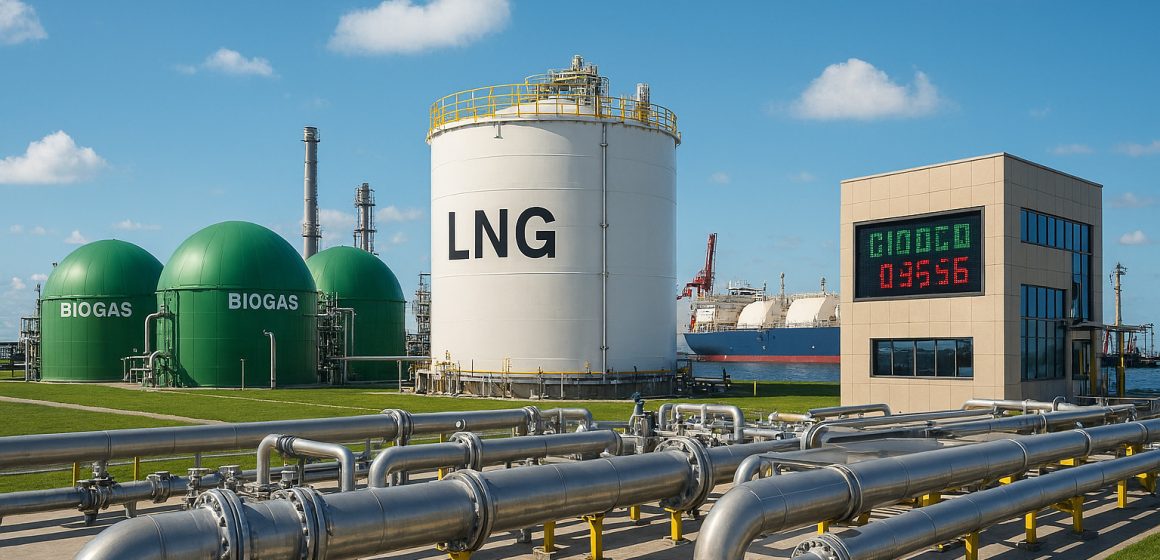With record LNG cargoes, digital transformation, biogas ventures, and a ship-leasing arm at GIFT-IFSC, the company also made a strategic shift towards operational agility and global competitiveness with an eye on future expansion.
Expansion of its pipeline network, high throughput in transmission, record trading sales, sustained growth of its fledgling petrochemicals business, and increased liquefied natural gas (LNG) cargoes led India’s largest gas supplier, GAIL, to report its best-ever financial performance in FY2025.
GAIL’s profit before tax (PBT) rose by over 28 per cent to ₹148.25 billion, up from ₹115.55 billion in FY2024. Similarly, profit after tax (PAT) registered a 28 per cent increase, amounting to ₹113.12 billion compared to ₹88.36 billion in the previous year. Operational revenue increased to ₹1.37 trillion from ₹1.31 trillion.
“It is pertinent to underscore that these exceptional financial outcomes were achieved notwithstanding a volatile and evolving global landscape marked by economic complexity and uncertain geopolitical headwinds. During FY2025, persistent international tensions and regional instabilities exerted considerable influence over global trade and energy dynamics,” Rakesh Kumar Jain, CFO, said during the address delivered on behalf of Sandeep Kumar Gupta, Chairman, at the company’s 41st AGM on August 29.
The company also executed capital expenditure amounting to ₹105.12 billion during the last fiscal year.
With an operational network extending over 16,000 km, the company continued to expand its presence in the national gas grid, commissioning approximately 277 km of new pipelines and undertaking lowering works on over 717 km of pipeline length. Notable projects under execution include the Durgapur-Haldia and Dhamra-Haldia sections of the Jagdishpur-Haldia and Bokaro-Dhamra natural gas pipeline, the Srikakulam-Angul spur pipelines, the Mumbai-Nagpur-Jharsuguda corridor, the Krishnagiri-Coimbatore section of the Kochi-Koottanad-Bengaluru-Mangaluru pipeline, and the Gurdaspur-Jammu pipeline.
GAIL’s gas transmission business reported an all-time high throughput, with average volume increasing by 6 per cent to 127.32 million metric standard cubic metres per day (MMSCMD) from 120.46 MMSCMD in the previous fiscal. The company owns and operates a 2,040 km liquefied petroleum gas (LPG) pipeline network, mainly comprising the 1,427 km Jamnagar-Loni Pipeline (JLPL) and the 610 km Vizag-Secunderabad Pipeline (VSPL). Together, JLPL and VSPL achieved the highest-ever throughput of 4.478 million metric tonnes per annum (MMTPA) during FY2025, compared to 4.396 MMTPA in FY2024.
Natural gas trading continued to be among the company’s core businesses, reporting the highest-ever sales of 101.49 MMSCMD, compared to 98.45 MMSCMD during FY2024.

Sustained Value Accretion
GAIL is also expanding its petrochemical business portfolio as part of its strategy to maximise value addition to natural gas. Petrochemicals production rose by 6 per cent to 827 thousand metric tonnes (TMT), compared to 777 TMT in the previous year, while sales increased by 7 per cent to 845 TMT. New facilities under development include a 60 thousand tonnes per annum (KTPA) polypropylene plant at Pata, a 500 KTPA polypropylene plant, and a 1.25 MMTPA purified terephthalic acid plant through wholly owned subsidiary GAIL Mangalore Petrochemicals Ltd.
In the city gas distribution (CGD) domain, GAIL and its group entities continued to maintain their leadership position in the country, with authorisation to develop CGD networks across 72 geographical areas out of a total of 307. GAIL and its group companies added nearly 1.228 million piped natural gas (PNG) connections and nearly 507 compressed natural gas (CNG) stations, reaching a cumulative base of approximately 9.57 million domestic PNG consumers and over 3,100 CNG stations. “During FY2025, the total combined CNG and D-PNG (domestic PNG) sales from GAIL’s CGD entities amounted to approximately 15.4 MMSCM, which works out to over 54 per cent market share,” Jain added.
The company also executed record LNG cargoes, advanced digital transformation, and launched biogas ventures, marking a strategic shift towards operational agility and global competitiveness with an eye on future expansion.
LNG Imports Hit All-Time High
The company imported a record 141 LNG cargoes, the highest-ever in its operational history. Additionally, to maximise power generation in the summer season from gas-based generating stations, the company sourced five spot cargoes and approximately 112 MMSCMD of regasified liquefied natural gas (RLNG) in April-June 2024.
A landmark achievement was the successful construction of the long-awaited breakwater project at the Dabhol LNG terminal, operated by GAIL’s subsidiary, Konkan LNG Ltd. “This critical development has now transformed Dabhol LNG Terminal into an all-weather port and significantly enhanced your company’s operational agility and flexibility,” Jain informed.
In the area of LNG shipping, GAIL inducted a state-of-the-art vessel, renamed GAIL Sagar, under a long-term charter agreement from a UK company. This vessel constitutes the fifth LNG carrier in GAIL’s fleet and shall remain on charter till December 2038, the longest charter in its history. A long-term vessel charter contract was also awarded to a Japanese company for deployment during the period 2027-38.
In January 2025, GAIL settled and realised $285 million towards its claim against Singapore-based Shell Methane Trading Singapore (SMTS) for breach of contract due to non-supply of contracted LNG volumes in FY2023. In another key development, it signed its second advance pricing agreement with the Central Board of Direct Taxes, covering the transfer pricing margin applicable to GAIL’s long-term LNG sourcing contracts from the US through its wholly owned subsidiary.
Towards promoting LNG in transportation and allied sectors, GAIL and its subsidiaries have established 12 LNG and liquefied-to-compressed natural gas (LCNG) stations along major highways and mining belts.
Sustainability and Digitalisation Moves
FY2025 also witnessed GAIL take its first steps in the biogas generation business, with the inauguration of its first compressed biogas (CBG) plant in Ranchi by Prime Minister Narendra Modi in October 2024. Simultaneously, a strategic partnership was established with TruAlt Bioenergy Ltd for the development of ten new biogas plants.
“Furthering its clean energy ambitions, GAIL is actively pursuing investments in advanced technologies such as green chemicals, carbon capture, utilisation and storage (CCUS), bio-ethylene, and coal-to-synthetic natural gas,” Jain stated.
Coal Gas India Ltd—a GAIL and Coal India Ltd joint venture—was incorporated in March 2025 to set up a coal-to-SNG (synthetic natural gas) plant in West Bengal and has been selected for incentives of up to ₹13.50 billion under Category-1 of the request for proposal issued by the Ministry of Coal for coal gasification projects.
GAIL also advanced its digital transformation agenda by becoming the first Maharatna public sector enterprise to fully implement the next-generation enterprise resource planning suite SAP S/4 HANA on i-Cloud. This move is expected to streamline operations, improve data accuracy, and support faster decision-making. The company has also adopted group reporting for financial consolidation and launched Project Sanchay-2, which leverages 30 data analytics use cases to drive process innovation. These initiatives are aimed at enhancing transparency, agility, and operational efficiency across its business verticals.
The company has incorporated a wholly owned subsidiary—GAIL Global IFSC Ltd—at GIFT City, Gujarat, to strengthen its international financial operations. The entity is tasked with managing treasury operations and exploring ship-leasing opportunities. In the long term, this could enable GAIL to optimise capital flows, reduce financing costs, and compete more effectively with global energy players. Similar arrangements are common among international oil and gas majors, which often operate treasury and leasing arms in offshore financial centres to support global expansion and asset management.
-Manish Pant


